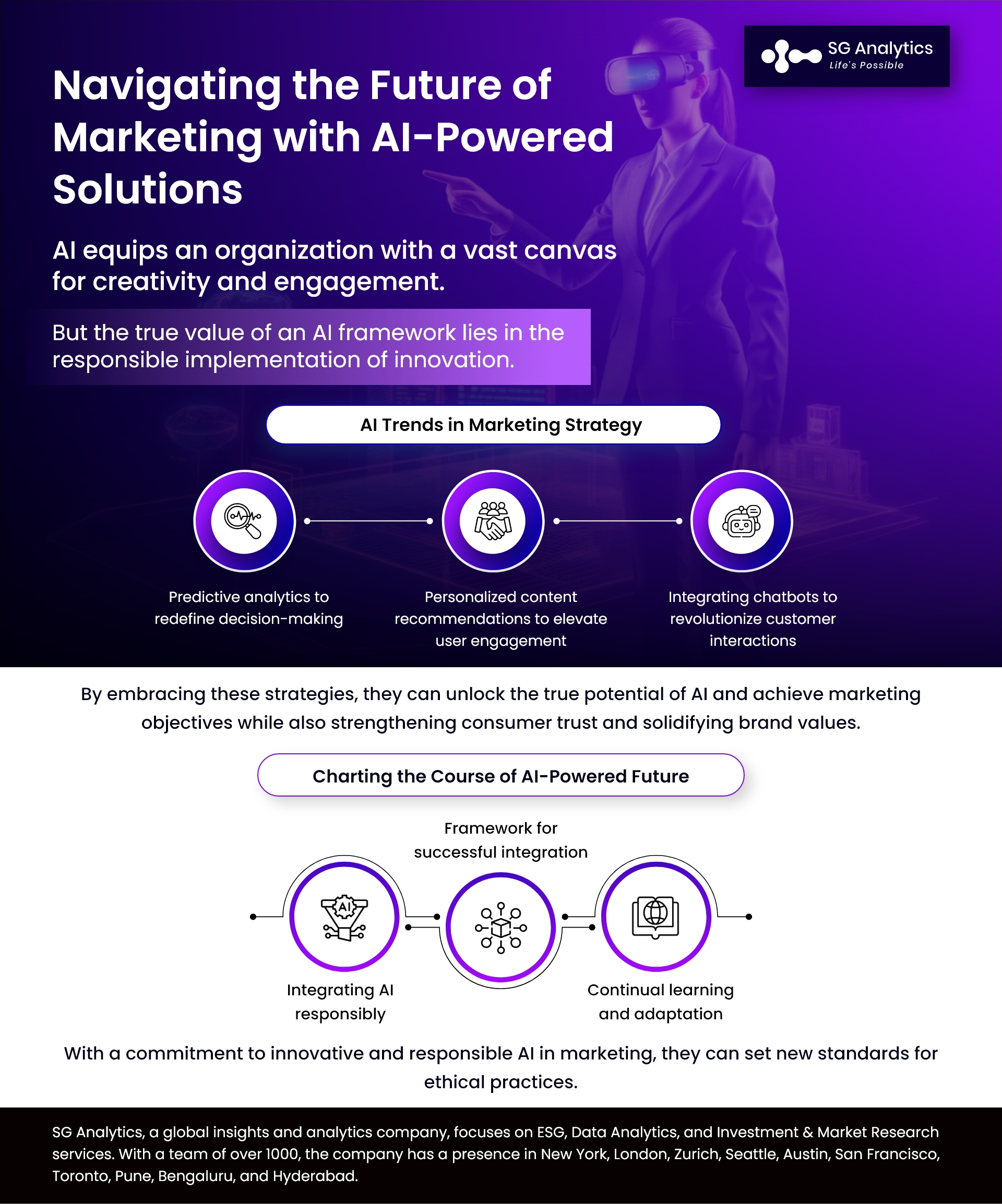The marketing landscape is evolving constantly, and AI is further equipping them to stand out. A powerful tool for personalization, efficiency, and content creation, AI also poses some critical challenges, including AI's tendency to generate factually incorrect information. These inaccuracies - from fabricated content to biased outputs - can damage brand reputation and corrupt consumer trust. While this raises concerns, it has not deterred marketers from exploring the numerous benefits of responsible AI implementation.
The Challenges of AI
AI models are trained on vast datasets, enabling them to create compelling content. However, these models can turn into the realm of misinformation, creating seemingly convincing but factually incorrect information.
Examples of AI Challenges in Marketing
- Misleading social media content
- Biased chatbots
- Inaccurate product descriptions
Recognizing these pitfalls is the first critical step toward leveraging AI responsibly in marketing efforts. However, this remarkable progress of AI also presents a host of ethical implications that demand careful consideration.
- The Dual Nature of AI: While AI offers unprecedented advancements, its potential misuse does pose significant ethical, social, and legal challenges.
- The Need to Integrate Ethical Oversight: With AI becoming more integrated into daily life, there is a growing urgency to address its ethical ramifications.
- The Balancing Act: Leveraging AI for innovation and safeguarding the frameworks against risks will help in striking the right balance.
Read more: Data Revolution: Empowering Businesses for a Data-driven Future
AI is increasingly used to generate marketing materials, including content creation and targeting. However, if the underlying data contains stereotypes or biases, the AI system can perpetuate them, which can result in negative consequences for our clients. AI is also a powerful tool for identifying target demographics for campaigns used by clients. However, if the data used to define these demographics is inaccurate, the AI framework might target the wrong audience entirely. This can lead to wasted resources and overlooked opportunities.

The Current Landscape: AI Trends in Marketing Strategy
In the fast-paced realm of marketing, AI is a dynamic force that is rapidly reshaping critical marketing strategy. Several key trends are highlighting the transformative impact of AI on marketing practices. These trends represent the tangible shifts that businesses should be attuned to:
-
Predictive Analytics to Redefine Decision-Making
Predictive analytics, fueled by AI, is becoming critical for strategic decision-making. By analyzing vast datasets, organizations can anticipate market trends, customer behaviors, and potential opportunities. This trend further empowers them to make informed choices, minimize risks, and maximize the effectiveness of their marketing campaigns and strategy.
-
Personalized Content Recommendations to Elevate User Engagement
AI-driven personalization has grown beyond basic customization. Advanced algorithms assist in analyzing user behavior and historical interactions to provide hyper-personalized content. This helps enhance user engagement and fosters a deeper connection with their target audience.
Read more: Integrating Generative AI In Banking: Risks and Benefits
-
Integrating Chatbots to Revolutionize Customer Interactions
Chatbots, powered by natural language processing or NLP, have become indispensable in customer service. These AI-driven frameworks provide instant responses to customer queries and guide them through complex processes. Integrating chatbots further enhances efficiency and assures round-the-clock availability.
It has become evident that AI is not a distant prospect but a significant reality shaping marketing strategy. The integration of AI into marketing strategy is opening a spectrum of opportunities. For organizations, navigating this dynamic terrain requires a nuanced understanding of the obstacles to overcome as well as the avenues to explore. By embracing these trends, organizations can gain a competitive edge in today's dynamic marketing landscape.

Navigating the AI-Powered Future of the Marketing Landscape
As organizations navigate the intricate terrain of AI-powered marketing, it is equally important to understand the potential for innovation and growth. The key to leveraging AI in marketing lies in implementing the framework strategically while also acknowledging its limitations and emphasizing ethical use. AI systems thrive on continuous learning, which is achieved by setting up A/B testing and comparing AI-driven strategies with traditional methods. This equips organizations to measure the impact of AI and refine their approach.
The future holds the promise of unprecedented efficiency, strategic insights, and personalized customer experiences that can reshape the trajectory. However, this transformative journey comes with its share of challenges and ethical considerations.
Read more: Data-Driven Decision-Making: The Key to Thriving in the Digital Age
-
Integrating AI Responsibly
The path forward involves embracing AI responsibly, with an awareness of ethical considerations. Organizations need to prioritize transparency, fairness, and user empowerment while also working towards setting a foundation for ethical AI practices. By fostering a culture of responsible AI, they can harness the potential of AI and ensure its positive impact on society.
-
Framework for Successful Integration
Crafting a blueprint for the successful integration of AI in marketing requires strategic planning and adaptability. Organizations need to proactively address challenges like bias mitigation, data privacy, and the societal impact of AI. Implementing robust strategies, as well as staying abreast with the ethical guidelines, will further help overcome obstacles and foster a positive AI-powered landscape.
-
Continual Learning and Adaptation
In today's dynamic landscape of AI marketing, the journey is set to evolve continuously. For organizations navigating this AI-powered future, elevating their marketing strategy with personalized guidance along with strategic planning and hands-on support is critical. Continuous learning and adaptation are critical to stay informed about emerging technologies along with industry standards and ethical guidelines. Sharing insights and contributing to collective knowledge will help in shaping the responsible use of AI in marketing.
Read more: Unlocking the Power of Unstructured Data with AI

The Road Ahead
Responsible AI usage is about more than just avoiding misinformation; it is also about building trust, transparency, and ethical brand practices. While AI equips an organization with a vast canvas for creativity and engagement, the true value of an AI framework lies in the responsible implementation of innovation.
For marketers, it is more critical than ever to incorporate AI into their marketing strategies to navigate the changing landscape swiftly. By embracing these strategies, they can unlock the true potential of AI and achieve marketing objectives while strengthening consumer trust and solidifying brand values. With a commitment to innovative and responsible AI in marketing, they can set new standards for ethical practices.
SG Analytics, recognized by the Financial Times as one of APAC's fastest-growing firms, is a prominent insights and analytics company specializing in data-centric research and contextual analytics. Operating globally across the US, UK, Poland, Switzerland, and India, we expertly guide data from inception to transform it into invaluable insights using our knowledge-driven ecosystem, results-focused solutions, and advanced technology platform. Our distinguished clientele, including Fortune 500 giants, attests to our mastery of harnessing data with purpose, merging content and context to overcome business challenges. With our Brand Promise of "Life's Possible," we consistently deliver enduring value, ensuring the utmost client delight.
A leader in Market research services, SG Analytics enables organizations to achieve actionable insights into products, technology, customers, competition, and the marketplace to make insight-driven decisions. Contact us today if you are an enterprise looking to make critical data-driven decisions to prompt accelerated growth and breakthrough performance.
About SG Analytics
SG Analytics (SGA) is a global data solutions firm that harnesses data with purpose across the data value chain - from origination, aggregation, management, modernization, and analytics to insights generation to create powerful business outcomes for its customers. Through its research and data analytics consulting services, SGA marries content with context to provide bespoke solutions to its customers, enabling them to improve efficiency, scale, and grow. The company has a presence in New York, London, Zurich, Seattle, Austin, San Francisco, Toronto, Pune, Bangalore, Hyderabad and Wroclaw. The firm serves customers across the banking, financial services and insurance (BFSI), technology, media and entertainment (M&E), and healthcare sectors, amongst others, including Fortune 500 companies.
Apart from being recognized by reputed firms such as Analytics India Magazine, Everest Group, and ISG, SG Analytics has been recently awarded as the top ESG consultancy of the year 2022 and Idea Awards 2023 by Entrepreneur India in the “Best Use of Data” category.









